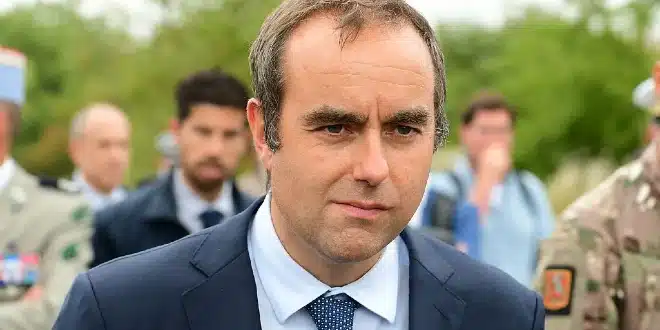French President Emmanuel Macron has appointed outgoing defense minister Sébastien Lecornu as the country’s new prime minister, handing him the difficult task of building consensus in a fractured parliament and pushing through the 2026 budget. The move comes after Prime Minister François Bayrou resigned on Monday, ending his tenure after only nine months in office.
Bayrou’s downfall was tied to his failure to deliver on one of Macron’s central promises: curbing France’s growing deficit. Ahead of the confidence vote that sealed his fate, he warned lawmakers that removing him would not make the underlying crisis disappear. “You have the power to bring down the government,” Bayrou told parliament, “but you do not have the power to erase reality. Expenses will continue to rise, and the burden of debt will grow heavier.”
Lecornu Faces a Divided Parliament and Public Unrest
Lecornu, 39, now takes on the dual challenge of stabilizing France’s shaky finances while also navigating a parliament that has been gridlocked since Macron’s ill-fated snap election in 2024. The president’s office said Lecornu’s mandate is to consult political forces across the assembly to secure passage of the national budget and find “the agreements essential to decisions in the coming months.”
That will be no easy task. Protests and blockades are already scheduled for Wednesday, with a broader union-led strike planned for September 18. France’s streets are bracing for disruption, echoing a wider sense of political fatigue and public anger.
Why France Keeps Facing Political Deadlock
The current instability stems from Macron’s gamble last year, when he called a snap parliamentary election after the far-right National Rally (RN) surged in the European elections. The move backfired, stripping his centrist bloc of its majority and leaving parliament deeply polarized between the far right and the left.
This has made governing nearly impossible. France’s Fifth Republic, created in 1958 under Charles de Gaulle, was designed to avoid the instability of earlier eras by strengthening the presidency. For decades, power alternated between mainstream left- and right-wing parties. Macron’s rise in 2017 disrupted that system: he was the first president elected without backing from either traditional party.
Re-elected in 2022, Macron quickly lost his majority as voters drifted to the extremes. For two years, he relied heavily on Article 49.3 of the constitution, which allows the government to push legislation through without a parliamentary vote. The practice angered both lawmakers and the public, eroding trust in his leadership.
The Challenge for Lecornu
By appointing Lecornu—an ally and the only minister to serve continuously since 2017—Macron signals continuity at a time when many expected compromise. While Lecornu is considered pragmatic, he leans further to the right than Bayrou, making it harder to strike deals with the Socialists, whose support would be crucial to passing the budget.
The Socialists are demanding wealth taxes and the reversal of Macron’s corporate tax cuts—policies strongly opposed by conservatives. Bayrou barely managed to hold this balance last year; Lecornu may find it even harder to walk the same line.
Still, there is one factor that could work in his favor: neither the left nor the right wants another snap election that could benefit Marine Le Pen’s RN. Both sides may grudgingly cooperate with Macron’s government to avoid losing more ground, though compromises will be limited.
Economic and Social Pressures Mount
Beyond politics, financial markets are showing signs of strain. French bond yields—the interest rates investors demand—have risen above those of Spain, Portugal, and even Greece, countries once at the heart of the eurozone debt crisis. A potential downgrade of France’s sovereign credit rating, expected later this week, could further dent confidence.
On the streets, frustration is boiling over. A recent Elabe poll suggests that in the event of fresh elections, the far-right National Rally would finish first, the left second, and Macron’s centrists a distant third. Many now assume the far right will take power in the next presidential election in 2027—if not sooner.
Protests under the slogan “Bloquons tout” (“Let’s block everything”) are planned for Wednesday, with unions threatening widespread disruption across transport and hospitals later in the month. Outgoing interior officials have already warned of “intense disruptions” nationwide.
A System at Breaking Point
Observers argue France is now at a moment of profound political paralysis. Dominique Moïsi, senior analyst at Institut Montaigne, compared the present deadlock with past crises: “De Gaulle survived assassination attempts, there was the Algerian war, May ’68 when the slogan was ‘France is bored.’ But today France is frustrated, furious, and full of hatred toward the elite.”
He added: “It feels like a regime change is inevitable. But no one can see what system would replace it, or who could lead it.”
For Macron and his newly appointed prime minister, the challenge is clear: deliver stability and reform in a fractured country, or risk accelerating France’s political realignment toward the extremes.


